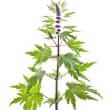Background
- Motherwort (Leonurus species) is a plant that is native to Asia but grows all around the world. The leaves look like the tail of a lion, giving motherwort the nicknames "lion's tail" and "lion's ear."
- Motherwort has a long history of use in Chinese medicine. Motherwort has been used most widely for women's health, including childbirth, afterbirth care, irregular menstrual cycles, and premenstrual anxiety, as well as to treat heart disorders.
- Motherwort has been studied for use in a variety of conditions, including prostate disorders, arthritis, kidney disease, and stomach problems. However, there is little information on the effects of motherwort alone, and more high-quality trials are needed before conclusions can be made.
References
- Bernatoniene J, Kucinskaite A, Masteikova R, et al. The comparison of anti-oxidative kinetics in vitro of the fluid extract from maidenhair tree, motherwort and hawthorn. Acta Pol.Pharm. 2009;66(4):415-421. View Abstract
- Chang CF and Li CZ. [Experimental studies on the mechanism of anti-platelet aggregation action of motherwort]. Zhong.Xi.Yi.Jie.He.Za Zhi. 1986;6(1):39-40, 5. View Abstract
- Chen Y. The application of giant typhonium (Typhonium giganteum) in the treatment of brain glioma. Chinese Journal of Information on Traditional Chinese Medicine 2007;14(1):81.
- Duan X, Song F, Yang G, et al. Blood rheological changes in dairy cows with ovarian disturbances before and after treatment. Chinese Journal of Veterinary Science and Technology 1995;25(9):25-27.
- Fokina GI, Frolova TV, Roikhel VM, et al. [Experimental phytotherapy of tick-borne encephalitis]. Vopr.Virusol. 1991;36(1):18-21. View Abstract
- Hu S. A contribution to our knowledge of Leonurus L., i-mu-ts'ao, the Chinese motherwort. Am.J.Chin Med. 1976;4(3):219-237. View Abstract
- Liu C, Ma L, Li W, et al. The relationship between the level of sex hormone and the aetiological types in young female patients with acne. Chinese Journal of Information on Traditional Chinese Medicine 2012;10(11):82-84.
- Li M and Zhang S. The effects of Traditional Chinese Medicine on antibody levels in women with recurrent spontaneous abortion (RSA). Chinese Journal of Information on Traditional Chinese Medicine 2005;12(7):59-60.
- Li X, Yang X, Li D, et al. Enhancing disease resistance in transgenic tomato over-expressing antimicrobial proteins, LjAMP1 and LjAMP2 from motherwort seeds. Acta Phytophylacica Sinica 2012;34(4):353-358.
- Masteikova R, Muselik J, Bernatoniene J, et al. [Antioxidant activity of tinctures prepared from hawthorn fruits and motherwort herb]. Ceska.Slov.Farm. 2008;57(1):35-38. View Abstract
- Shi L, Shen M, Peng Y, et al. The protective effects of Huoxueyangyin Granules on rat myocardial ischemia induced by isoprenaline. Chinese Journal of Information on Traditional Chinese Medicine 2012;13(4):27-28.
- Song J, Sun C, Gu Y, et al. The application of Traditional Chinese Medicine in the treatment of bradyarrhythmias. Chinese Journal of Information on Traditional Chinese Medicine 2006;13(1):77-78.
- Tachjian A, Maria V, and Jahangir A. Use of herbal products and potential interactions in patients with cardiovascular diseases. J.Am.Coll.Cardiol. 2-9-2010;55(6):515-525. View Abstract
- Yang X, Xiao Y, Wang X, et al. Expression of a novel small antimicrobial protein from the seeds of motherwort (Leonurus japonicus) confers disease resistance in tobacco. Appl.Environ.Microbiol. 2007;73(3):939-946. View Abstract
- Yarnell E and Abascal K. Botanicals for regulating heart rhythms. Alternative & Complementary Therapies (England) 2003;9:125-129.







